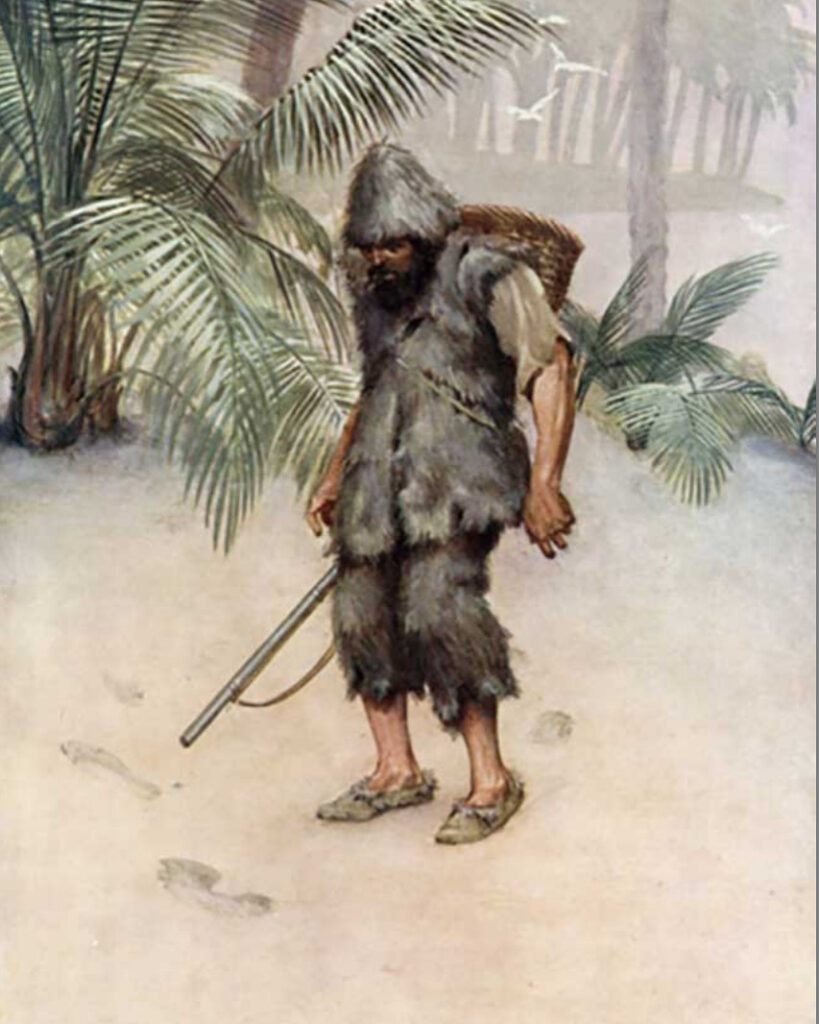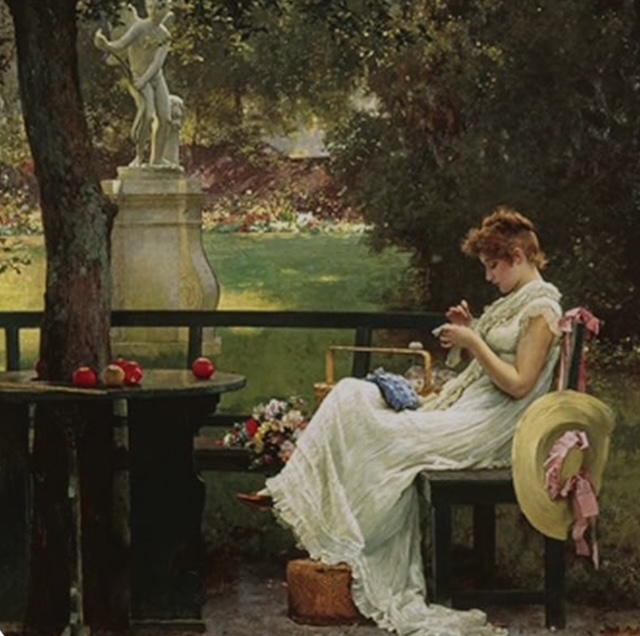
de Daniel Defoe
Mă gândesc la o călătorie în Brazilia. Vreau să-mi văd fiul, soția și plantația mea. Cred că mă pot muta în Brazilia. Dar nu știu dacă soția mea vrea să locuiască cu mine.
După ce mă mai gândesc un pic, mă hotărăsc să plec în Brazilia, dar doar pentru o vizită. Vreau să văd dacă este în regulă să locuiesc din nou acolo. Îi scriu soției mele. O întreb dacă este în regulă să-i vizitez câteva zile. Odată cu scrisoarea, îi trimit cadouri frumoase ei și familiei tatălui ei.
Apoi primesc o scrisoare de la soția mea. Ea scrie că sunt binevenit să-i vizitez. Invitația ei mă face fericit. Încep să plănuiesc o altă călătorie pe mare. Le cumpăr cadouri frumoase. Două săptămâni mai târziu sunt gata să plec.
Când ajungem în Brazilia, mă întâlnesc cu soția și fiul meu. Soția mea este diferită acum. Dar ea este încă foarte frumoasă. Fiul meu este un om mare. El este foarte puternic. De asemenea, el este foarte inteligent. Are și propria lui familie. Are și o mare responsabilitate. El are grijă de plantațiile familiei. El este responsabil pentru un teren mare.
Fiul meu vorbește doar portugheză și puțin în spaniolă. Portugheza mea nu este prea bună după atâția ani. Nu-mi amintesc multe cuvinte. Îmi amintesc doar câteva cuvinte de bază. Dar cu timpul încep să îmi amintesc repede cuvintele.
În două săptămâni, pot avea o conversație de bază pe multe subiecte. Și o lună mai târziu, sunt capabil să vorbesc foarte bine.
Sunt foarte fericit că pot vorbi cu soția și fiul meu. Avem atât de multe lucruri de povestit!
Brazilia este, de asemenea, foarte diferită. Oamenii au haine diferite. Ei construiesc noi tipuri de case. Plantațiile sunt mult mai mari. Mulți oameni lucrează la ele.
Sunt cu familia mea de trei luni. Știu că nu sunt foarte departe de insula mea. Mă gândesc să vizitez din nou insula. Vreau să văd insula doar pentru câteva zile. Vineri vrea și el să revadă insula.
Și fiul meu vrea să meargă. Cred că nu este o idee bună. Știu cât de periculoasă poate fi marea. Dar vrea să vadă locul pe care îl cunoaște doar din poveștile mele.
Ne planificăm călătoria. Două săptămâni mai târziu, plecăm din Brazilia. Mergem cu o navă care merge la Havana. Avem o înțelegere cu căpitanul. Promite că se va opri la insula mea.
Când ajung pe insula mea, ne întâlnim cu oamenii lui Vineri. Acum ei locuiesc pe insulă.
Îi întreb: „Unde sunt prizonierii?”
Ei îmi spun că prizonierii nu sunt pe insulă. Ei nu știu unde sunt. Poate că sunt toți morți.
Oamenii lui Vineri îmi spun că nu mănâncă europeni. Ei își mănâncă doar dușmanii de pe alte insule. Sunt fericit când aud asta.
Vreau să rămân pe insulă și fiul meu vrea și el. Îl întreb pe căpitan dacă ne poate duce înapoi în Brazilia la întoarcere. El este de acord.
Văd mulți copii care aleargă. Este interesant să văd mulți oameni pe insula mea.
Văd că oamenii de pe insulă sunt foarte fericiți. Vineri este fericit și el. Întâlnește o femeie. Îi place de ea foarte mult.
Vineri mă întreabă dacă este în regulă să stea pe insulă cu femeia lui. El știe că trăiește datorită mie. Nu vrea să mă părăsească fără permisiunea mea.
Sunt de acord. Nu trebuie să stea cu mine toată viața. Este timpul ca Vineri să-și întemeieze propria familie. Sunt fericit că a găsit o femeie bună. Mă bucur când văd că se iubesc. Respect decizia lui Vineri de a rămâne pe insulă.
Mă plimb mult pe insulă. Vreau să vizitez toate locurile pe care le cunosc din viața mea pe insulă. Am câteva locuri preferate, de exemplu valea fructelor. Petrec mult timp acolo. Îmi place foarte mult acest loc. Și fiului meu îi place insula. El se plimbă adesea pe insulă cu mine. Îi spun multe alte povești despre viața mea aici.
Stăm pe insulă douăzeci de zile. Apoi vine nava de la Havana. E timpul să plecăm. Ne luăm rămas bun de la Vineri și de la oamenii lui.
Când părăsim insula, am un sentiment ciudat. Simt lacrimi în ochi. Îmi place foarte mult acest loc. Inima mea este legată de această insulă pentru totdeauna.
in English:
I think about a journey to Brazil. I want to see my son, my wife and my plantation. I think that I can move to Brazil. But I don’t know if my wife wants to live with me.
After some longer thinking, I decide to go to Brazil but only for a visit. I want to see if it’s OK to live there again. I write to my wife. I ask her if it’s OK to visit them for some days. With the letter, I send nice presents to her and her father’s family.
Then I get a letter from my wife. She writes that I’m welcome to visit them. Her invitation makes me happy. I start to plan another journey by sea. I buy nice presents for them. Two weeks later I’m ready to go.
When we arrive to Brazil, I meet with my wife and my son. My wife is different now. But she is still very beautiful. My son is a big man. He is very strong. He is also very intelligent. He has his own family too. He has also big responsibility. He manages plantations of all the family. He is responsible for a big land.
My son speaks only Portuguese and a little Spanish. My Portuguese isn’t very good after so many years. I don’t remember many words. I remember only some basic words. But with practice I start to remember words fast.
In two weeks, I can have a basic conversation on many topics. And one month later, I’m able to speak very well.
I’m very happy that I can speak with my wife and my son. We have so many things for a conversation.
Brazil is also very different. People have different clothes. They build new types of houses. Plantations are much bigger. Many people work on them.
I’m with my family for three months. I know that I’m not very far from my island. I think about visiting the island again. I want to see the island for some days. Friday also wants to see the island again.
My son also wants to go. I think that it isn’t a good idea. I know how dangerous the sea can be. But he wants to see the place which he knows only from my stories.
We plan our journey. Two weeks later, we leave Brazil. We go on a ship which goes to Havana. We have an agreement with the captain. He promises to stop at my island on the way there.
When I arrive at my island, we meet with Friday’s people. They now live on the island.
I ask them, “Where are the prisoners?”
They tell me that the prisoners are not on the island. They don’t know where they are. Maybe they are all dead.
Friday’s people tell me that they don’t eat Europeans. They eat only their enemies from other islands. I’m happy when I hear that.
I want to stay on the island and my son too. I ask the captain if he can take us back to Brazil on the way back. He agrees.
I see many children who run around. It’s interesting to see many people on my island.
I see that the people on the island are very happy. Friday is happy there too. He meets a woman. He likes her very much.
Friday asks me if it’s OK that he stays on the island with his woman. He knows that he lives thanks to me. He doesn’t want to leave me without my permission.
I agree. He doesn’t have to stay with me all his life. It’s time for Friday to start his own family. I’m happy that he has a good woman. I’m happy when I see that they love each other. I respect Friday’s decision to stay on the island.
I walk around the island a lot. I want to visit all the places which I know from my life on the island. I have some favourite places, for example the fruit valley. I spend a lot of time there. I like this place very much. My son likes the island too. He often walks around the island with me. I tell him many other stories about my life here.
We stay on the island for twenty days. Then the ship from Havana comes. It’s time to leave. We say goodbye to Friday and his people.
When we leave the island, I have a strange feeling. I feel tears in my eyes. I like this place very much. My heart is connected with this island forever.

